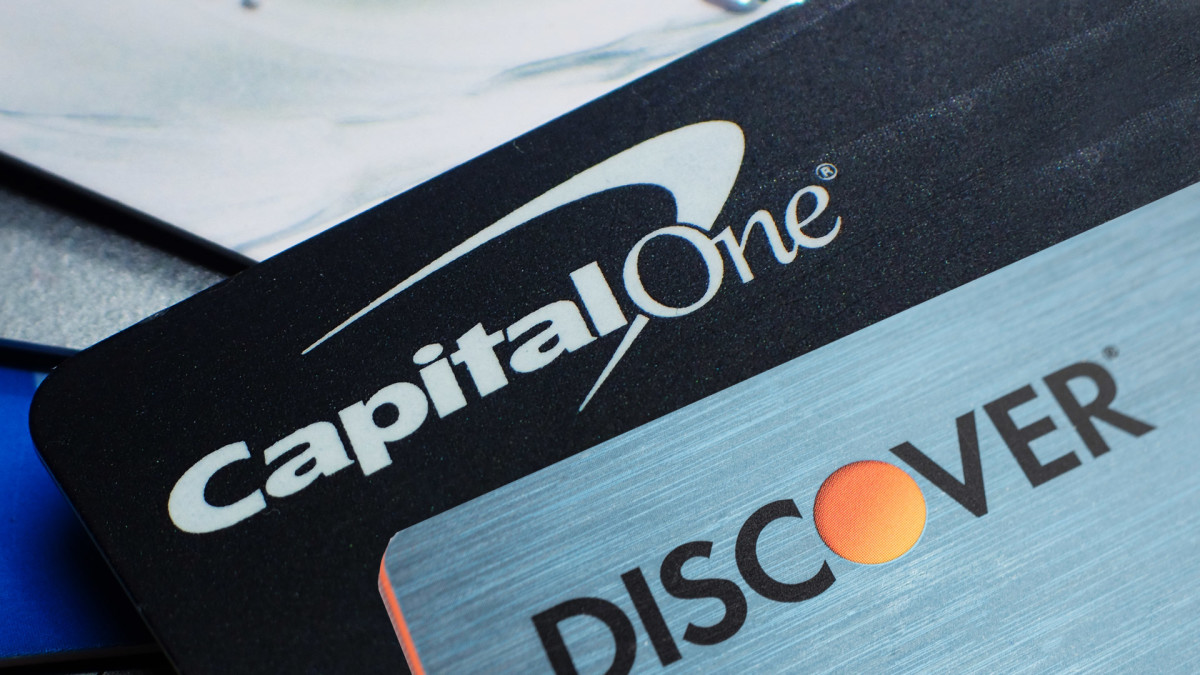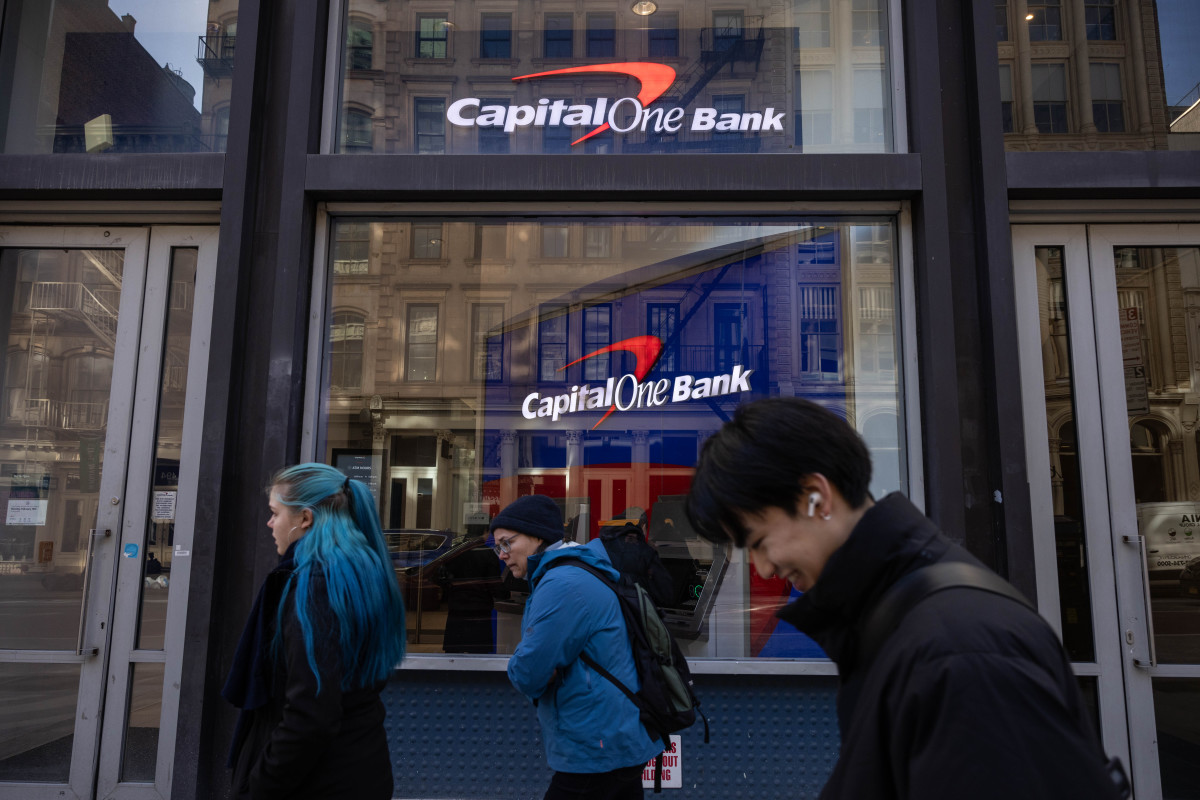
Capital One Financial's (COF) surprise $35 billion takeover of Discover Financial Services could provide the first major test of President Joe Biden's effort to limit big bank mergers and increase competition in the broader U.S. consumer lending market.
The proposed deal, which will see Capital One shareholders owning around 60% of the combined group, would create the biggest player in the domestic credit card market and the sixth-largest U.S. bank by assets.
That could be a big problem.

A major merger between two giants
Capital One, for its part, would immediately elevate the overall balance of its customer base to include the higher-earning cardholders of Discover while leveraging its users onto that group's global payments network, which some analysts consider the jewel of the $35 billion deal.
Discover's (DFS) three payment networks, which include Diners Club International and the Pulse debit card network, have over 70 million merchant acceptance points across 200 countries. This base is the fourth largest in the world, behind Visa (V) , Mastercard (MA) , and American Express (AXP) .
Related: Housing needs time to recover. Interest rates won't help.
“This is a historic moment in the payments world, and it represents a material shift in the competitive landscape," said Third Bridge analyst Kevin Kennedy.
"While Discover brings over predominately midmarket cardholders, we are particularly interested in the network piece of the acquisition and Capital One's ability to position themselves as the opposing network issuer to American Express,” he added.
Credit-card merger in the crosshairs
That portion of the deal and the fact that only 10 companies control around 90% of the overall credit card market likely puts the entire combination firmly in the crosshairs of U.S. regulators, starting with the Justice Department and the Federal Trade Commission.
Biden, as part of a sweeping array of consumer-focused rule changes proposed in an executive order in the summer of 2021, asked for "updated guidelines on banking mergers to provide more robust scrutiny" from the DoJ, the Federal Deposit Insurance Corp., and the Federal Reserve.
Related: Billionaire George Soros bought this popular bank stock
The president also pressed the DoJ and the FTC to "enforce the antitrust laws vigorously" and challenge prior "bad mergers" that had slipped past previous administrations.
The two leading antitrust agencies responded in kind, bringing nearly 50 enforcement actions over the government's 2022 fiscal year, the most on record.
And they have continued to challenge big deals across all sectors, from Microsoft's (MSFT) $69 billion acquisition of videogame maker Activision Blizzard (ATVI) to the short-lived $120 billion merger talks between health insurance giants Humana (HUM) and Cigna (CI) .
Bloomberg reported Tuesday, in fact, that the FTC will sue to block the $24.6 billion merger between grocery store giants Kroger (KR) and Albertsons (ACI) .
Biden has also pushed for changes in the so-called junk fees that banks and credit card companies impose, which his administration says are costing Americans billions each year.
Sen. Dick Durbin (D-Illinois), who chairs the Senate Judiciary Committee, has meanwhile called the CEOs of Visa and Mastercard as well as bosses at American Airlines (AAL) and United Airlines (UAL) to face a hearing on credit card competition this spring.
“Visa and Mastercard have aggressively opposed efforts to bring competition to the credit card market in order to protect the dominant market position they share," Durbin said last month.
Time frame reflects regulatory hurdles
That focus on bank mergers and financial services fees is now sure to include the Capital One-Discover deal, a fact illustrated by the very first question in last night's investor call with Capital One CEO Richard Fairbank.
"We believe that we are well positioned for approval, but of course, we can't discuss our conversations with our regulators," Fairbank said.
Related: Cigna tumbles on Humana merger talk reports; FTC already probing PBMs
"Our teams will be filing the appropriate approval applications with both the Fed and the (Office of the Comptroller of the Currency) in the next couple of months, and we will then work through that process with both bank regulators," he said.
That challenge is likely reflected in the months-long time frame the deal was given before closure, with both Capital One and Discover indicating it may not be wrapped up until early next year.
“We are also prepared for a longer regulatory discourse around the acquisition since, on one hand, it benefits the proponents of (credit card competition) in providing an alternative routing option to Visa and Mastercard," said Kennedy of Third Bridge. "While on the other hand it significantly consolidates the credit card lending industry in a way that could reverberate antitrust rhetoric from the FTC.”
Jonathan Kanter, the DoJ's assistant attorney general in charge of antitrust, has said his team will consider how mergers may affect "competition for different customer segments" in the financial sector while ensuring that customers "retain a meaningful choice as to the type of bank with which they do business."
Meanwhile, FTC Chairwoman Lina Kahn echoed the DoJ's proposed merger rule changes. She noted last year that any new guidelines should "carefully scrutinize how proposed bank mergers will affect competition to serve the financing needs of new and small businesses and local communities."
Betting on the U.S. consumer?
Should regulators approve the deal, however, it's likely to be seen by investors as more of a play on cost savings and scaling existing technology than a massive bet on the health of the U.S. consumer.
Discover card customers typically need a FICO score north of 700 to qualify, and the group's broader financial rate of BBB- from S&P Global places it just inside the threshold for an investment-grade lender.
More Economy:
- Fed members just hat-tipped what's next for interest rates
- Retail sales tumble clouds impact of inflation data
- Jobs report shocker: 353,000 hires crush forecasts, stokes inflation fears
But the group set aside around $1.9 billion, more than double the total from the same period in 2022, to cover the potential for credit card delinquencies. It noted last month that the rate of cardholders who are 30 days overdue on their minimum payment rose to 3.87% at the end of last year, the highest in more than a decade.
The increase in both card delinquencies and the anticipated costs for further defaults paints a cautious picture for the U.S. consumer heading into the start of the year as inflation remains high and spending trends soften.
January retail sales fell 0.8% from December levels to a collective total of $700.3 billion, the Commerce Department said last week, more than four times lower than economists' forecasts and the weakest since March of last year.
Larger rival American Express, however, forecasted solid 2024 profit last month, thanks in part to its higher-income client base, following a record 2023 revenue of $60.5 billion.
Visa issued a lukewarm outlook on spending when it posted stronger-than-expected fourth-quarter earnings on Jan. 25. But it noted it wasn't seeing any "meaningful behavior change across consumer segments" heading into the start of the year.
Capital One CEO Fairbank told investors late Monday that the "enhanced scale and reach of our combined franchise will position us to compete more effectively against some of the largest banks and payment companies in the United States."
But with regulators circling, that might not be the last word.
Related: Veteran fund manager picks favorite stocks for 2024







